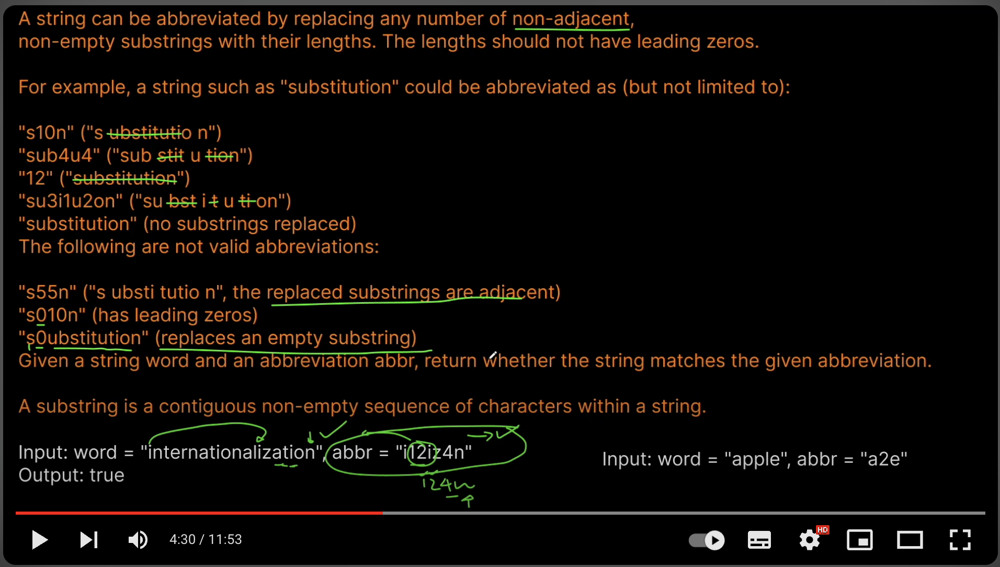Intuition
A string can be abbreviated by replacing any number of non-adjacent, non-empty substrings with their lengths. The lengths should not have leading zeros.
For example, a string such as “substitution” could be abbreviated as (but not limited to):
“s10n” (“s ubstitutio n”) “sub4u4” (“sub stit u tion”) “12” (“substitution”) “su3i1u2on” (“su bst i t u ti on”) “substitution” (no substrings replaced) The following are not valid abbreviations:
“s55n” (“s ubsti tutio n”, the replaced substrings are adjacent) “s010n” (has leading zeros) “s0ubstitution” (replaces an empty substring) Given a string word and an abbreviation abbr, return whether the string matches the given abbreviation.
A substring is a contiguous non-empty sequence of characters within a string.
Example 1:
Input: word = “internationalization”, abbr = “i12iz4n” Output: true Explanation: The word “internationalization” can be abbreviated as “i12iz4n” (“i nternational iz atio n”).
Example 2:
Input: word = “apple”, abbr = “a2e” Output: false Explanation: The word “apple” cannot be abbreviated as “a2e”.
Constraints:
1 <= word.length <= 20 word consists of only lowercase English letters.
1 <= abbr.length <= 10 abbr consists of lowercase English letters and digits. All the integers in abbr will fit in a 32-bit integer.
Approach

ref: https://www.youtube.com/watch?v=Sut-F029biM&ab_channel=CrackingFAANG
Two pointers solution To track progress through word and abbreviation
Complexity
-
Time complexity: O(N), in worst case
-
Space complexity: O(1), No data structure but storing variables.
Code
class Solution(object):
def validWordAbbreviation(self, word, abbr):
"""
:type word: str
:type abbr: str
:rtype: bool
"""
word_ptr = abbr_ptr = 0
while word_ptr < len(word) and abbr_ptr < len(abbr):
#Since the time of calling function makes Time constraints
#if abbr[abbr_ptr].isdigit():
# If it is leading zeros
if abbr[abbr_ptr] == "0":
return False
step = 0
# It could have two or more digits of abbreviation
#while abbr_ptr < len (abbr) and abbr[abbr_ptr].isdigit():
# For time constraints, we are not using idigit()
while abbr_ptr< len (abbr) and abbr[abbr_ptr] in '0123456789':
step = step * 10 + int(abbr[abbr_ptr])
#abbriviation pointer plus one
abbr_ptr += 1
if step > 0:
word_ptr += step
# word pointer shift to the step amount
#word_ptr += step
else:
if word[word_ptr] != abbr[abbr_ptr]:
return False
word_ptr += 1
abbr_ptr += 1
#Make sure that pointers reach the word length
return word_ptr == len(word) and abbr_ptr == len(abbr)